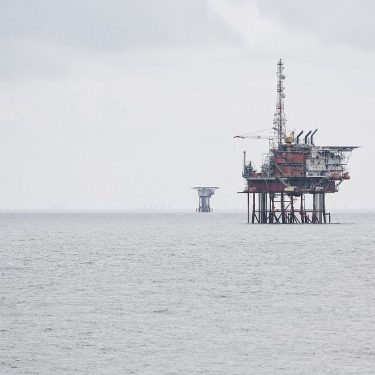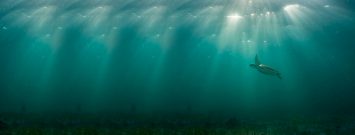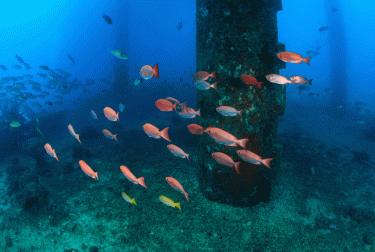About
The National Decommissioning Research Initiative (NDRI) has allocated $2.3 million over 2019-2022 to deliver the Phase 1 program and has a committed $2.4 million allocated for further research from 2023-2026 for Phase 2 to improve understanding of the interaction that occurs between the environment and oil and gas structures in Australia’s oceans. In particular, the NDRI seeks to improve understanding of how full removal or potential decommissioning in-situ may impact on the marine environment.
The program is currently funded by six industry partners and delivered by the Centre of Decommissioning Australia (CODA), an independent, not-for-profit organisation connecting stakeholders and experts in the oil and gas industry to support and enable key projects.
Decomissioning
Decommissioning is the process of removing or otherwise satisfactorily dealing with offshore petroleum property (plant and equipment) and petroleum wells (collectively referred to as infrastructure), in a safe and environmentally responsible manner, at the end of its useful life.
According to Australian Government Guidelines, the complete removal of infrastructure and the plugging and abandonment of petroleum wells is the default decommissioning requirement under the Offshore Petroleum and Greenhouse Gas Storage Act.
Options other than complete removal may be considered, however the titleholder must demonstrate that the alternative decommissioning approach delivers equal or better environmental, safety and well integrity outcomes compared to complete removal, and that the approach complies with all other legislative and regulatory requirements – including requirements under other Commonwealth laws
NDRI Background & Role
Australian law requires companies to investigate full removal of all oil and gas structures at the end of their productive life.
However, over time, these structures can promote the development of significant marine communities, including fish and corals.
The NDRI has been established to improve understanding across industry, government and the community of the effect of leaving or removing these facilities from the ocean.
In 2017, several members of the Australian oil and gas sector committed to pursuing a collaborative effort to undertake research into the influence that infrastructure has on the oceans.
In 2019, the NDRI was formally established with initial funding of $2.3 million available to undertake research through to 2022. In 2023 a further $2.4 million has been committed for further research from 2023-2026 for Phase 2 program delivery.
The NDRI is modelled on a successful program delivered in the North Sea, which is part of the Atlantic Ocean between the United Kingdom, Denmark, Norway, Sweden, Germany, the Netherlands, Belgium and France.
This program, named INSITE (INfluence of man made Structures In The Ecosystem), began in 2012 and has recently commenced a second phase of work.
Further resources are listed below.
Objectives
Initial objectives for the NDRI are to improve understanding of:
- Potential impact from decommissioning O&G structures on life in the marine environment; and
- Potential contaminants released in the marine environment if structures remain in-situ.
Many of the projects in the first phase of research have sought to lay the foundation for larger and longer research studies.
Further detail on the research program is available on the Research page.
Funding
The NDRI is funded by multiple industry partners.
Phase 1
- Shell Australia Pty Ltd
- Esso Australia Pty Ltd
- Chevron Australia Pty Ltd
- BHP Petroleum Pty Ltd
- Woodside Energy Ltd
- Santos Limited
- ConocoPhillips Pipeline Australia Pty Ltd
- Vermilion Oil and Gas Australia Ltd
Phase 2
- Shell Australia Pty Ltd
- Esso Australia Pty Ltd
- Chevron Australia Pty Ltd
- Woodside Energy Ltd
- Santos Limited
- Vermilion Oil and Gas Australia Ltd
Together, these companies comprise the Executive Committee of the NDRI. Further information is available under Governance.
Further information
Interest piqued? Further information on decommissioning is available on the CODA website.





